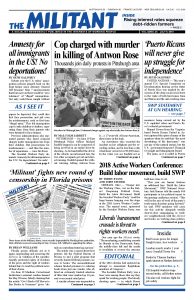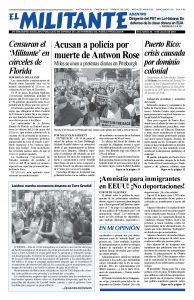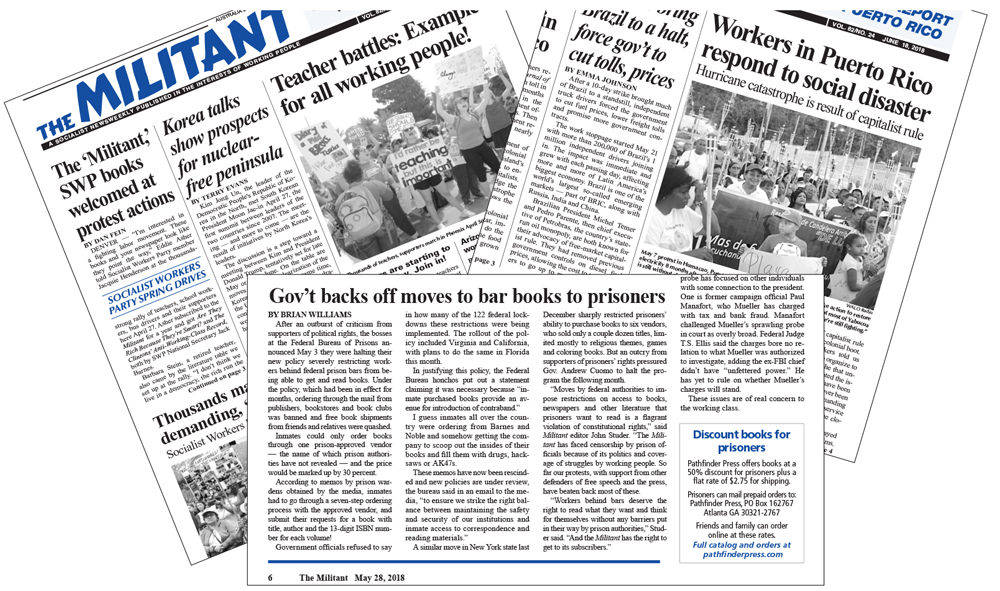Florida prison officials are at it again, impounding and censoring the Militant, in violation of the constitutionally protected rights of freedom of the press and the right of workers behind bars to read the political news of their choice.
On June 19 Madison Correctional Institution’s assistant warden banned the May 28 issue, falsely claiming that the article “Gov’t Backs Off Moves to Bar Books to Prisoners” gives “details on contraband entering a prison.”
The article was a report about how protests led the Federal Bureau of Prisons to end a pilot program that severely limited federal prisoners access to books. The unconstitutional scheme limited prisoners to ordering books from just one vendor, who offered an extremely limited selection of titles that were marked up 30 percent over normal retail price.
A similar scheme was suspended in New York state last December after protests there as well. Under the now-defunct New York program, prisoners had access to only a few dozen books, mostly games, coloring books and titles with religious themes.
Prison authorities at Florida State Prison in Raiford impounded the May 14 issue of the paper, claiming all nine English-language pages “showed organized protests around the state and seeks to organize inmates to strike.”
That issue featured firsthand reports, including a two-page center spread with a number of photos, on the teachers and school workers strike in Arizona, along with articles on May Day protests demanding amnesty for immigrant workers and denuclearization talks in Korea. There were also articles on the release of rap singer Meek Mill from prison, as well as the release of Herman Bell after nearly 45 years in prison. These are all questions that were also covered by most major bourgeois papers at the time.
In violation of Florida prison regulations, prison authorities never informed the Militant about their censorship. The paper learned about the impoundment from a subscriber, who wrote that prison officials there “don’t like your newspaper” and they conjure up pretexts to ban it.
When the Militant’s lawyer, David Goldstein, of the constitutional rights law firm Rabinowitz, Boudin, Standard, Krinsky and Lieberman, wrote to challenge the impoundments on June 25, the Florida Department of Corrections Literature Review Committee responded that the seizure of the May 14 issue had been reversed at its May 23 meeting.
At the same time, Committee Chair Dean Peterson told Goldstein there was an additional impoundment. The Tomoka Correctional Institution had just banned the June 18 Militant, a special issue featuring an eyewitness report from Puerto Rico. The Militant has not yet been informed of the alleged reason.
Goldstein also asked Peterson why another subscriber at Raiford hadn’t received a single issue of the paper in May or June. Peterson’s suggestion? Inmates should “make use of the grievance process.”
Over the last several years, Florida prison authorities have repeatedly impounded the paper on a wide variety of specious grounds. In the vast majority of these cases, the Militant — with the support of groups like the American Civil Liberties Union, the National Lawyers Guild, Amnesty International, PEN America, and prisoner rights, church and other organizations — has won reversal of the impoundments.
“Maybe some Florida officials mistakenly believe that sooner or later the Militant will get tired of fighting censorship and give up, but we won’t,” Militant editor John Studer said June 25. “We oppose any and all attempts to close down the space for working people and others to exchange views, and debate and discuss politics, outside or inside prison walls. The Militant is crucial in these debates, because our paper fights for the unity of working people and promotes a working-class road forward.”


